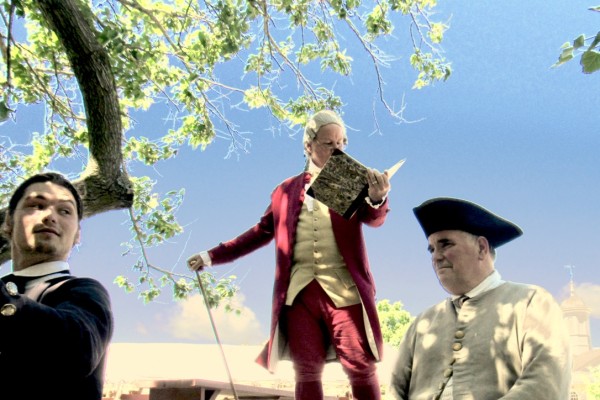 Just past noon on a warm Saturday afternoon there is the clanging of a bell not far from the Capitol. (Remember this bell. It’s going to come up again.) “Gentlemen, ladies, visitors to Williamsburg: Draw near and pay heed! Today there will be held a public auction upon Market Square at one-thirty of the clock consisting of the finest wares in this city. Bring your ready money!”
Just past noon on a warm Saturday afternoon there is the clanging of a bell not far from the Capitol. (Remember this bell. It’s going to come up again.) “Gentlemen, ladies, visitors to Williamsburg: Draw near and pay heed! Today there will be held a public auction upon Market Square at one-thirty of the clock consisting of the finest wares in this city. Bring your ready money!”
The bellowing voice belongs to Doug Paulson, very much looking the part in a striking red waistcoat. His call resembles the sort of announcement that would have preceded an 18th-century auction.
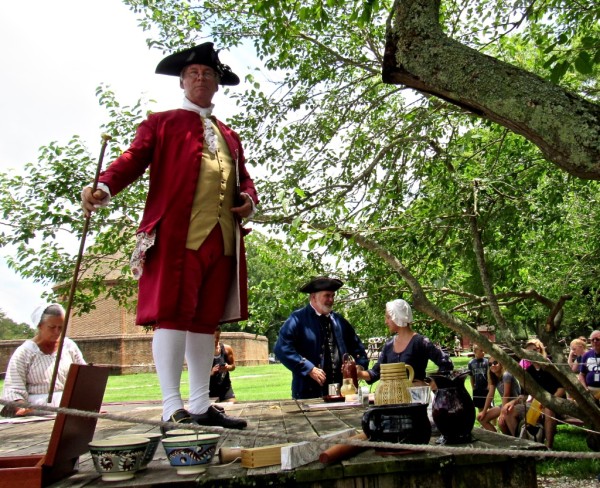 Paulson has been Colonial Williamsburg’s primary auctioneer since 2005. He assumes the role as Thomas Penne (pronounced “penny”), a persona which fittingly allows him to incorporate a family name that happens also to be a play on words.
Paulson has been Colonial Williamsburg’s primary auctioneer since 2005. He assumes the role as Thomas Penne (pronounced “penny”), a persona which fittingly allows him to incorporate a family name that happens also to be a play on words.
His mid-day stroll begins at Tarpley, Thompson & Co. at the corner of Botetourt Street. He stops at several points along Duke of Gloucester Street to repeat his auction announcement.
“I tell people, when you hear the Fifes and Drums, just follow them and take a left at the Courthouse and you’ll find the auction,” says Paulson.
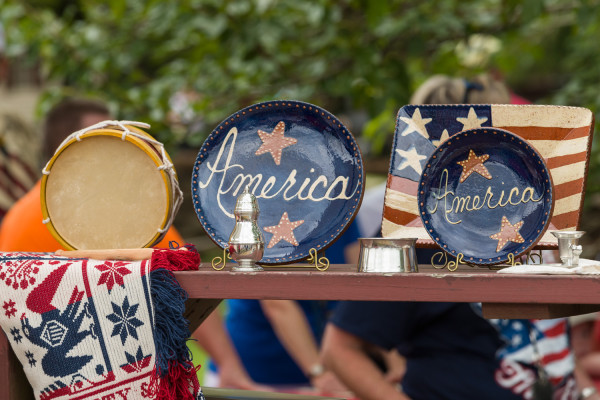
That left leads to a raised platform under a grand old tree on the north side of Market Square. A slew of wares lines this auction stage, allowing early arrivals to examine the merchandise up close.
The crowd is large and enthusiastic, even on a very hot day, and they arrive early. The auction is real, but it is meant to be fun. Guests know they will typically get a bargain. Sometimes it’s a pretty steep bargain. Some items are only available here at the auction.
John Greenhow, portrayed affably by Ryan Fletcher, opens the proceedings with a welcome and an overview of the rules, most importantly that there must be at least two bids by “persons unknown to each other.” A reserve price must be met. “Small letters of credit” will be accepted as payment, explains Mr. Greenhow, as he folds a paper into a small rectangle the size of a credit card. The illusion is preserved, delightfully.
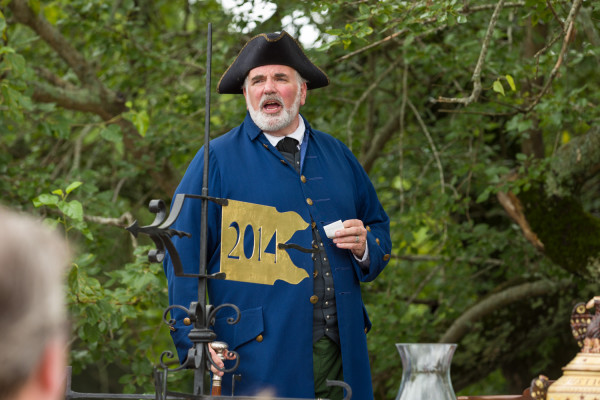 The auctioneer Mr. Penne mounts the steps and launches into bids for the first item. For the next hour or so, in spite of the heat, the jokes and good-natured insults flow freely, and the crowd only grows larger.
The auctioneer Mr. Penne mounts the steps and launches into bids for the first item. For the next hour or so, in spite of the heat, the jokes and good-natured insults flow freely, and the crowd only grows larger.
The bell, he declares, will come in about half an hour.
WAY BACK WHEN
Auctions were everyday events—and social occasions—in 18th-century Williamsburg. Often they allowed a merchant to present the latest goods from Europe, especially when the court was in session, and the town filled up with out-of-towners doing business. William Page advertised that he held sales every Monday.
Sometimes vendue masters appointed by the governor presided, but there were also private auctioneers. For example, Joseph Kidd, an upholsterer by trade, advertised his skills as an auctioneer in the Virginia Gazette.
Auctions were frequently signs of distress. Like today, people used credit to make purchases. “If somebody died or suffered financial reversals, there was no insurance,” Paulson points out. If someone was unable to make good on his or her accounts, or if the head of a household died, an auction of household goods was a likely way to settle their debts.

Even more grimly, the household’s assets might include enslaved African Americans who would be part of the sale, and who often faced separation from their families.
There was a rash of auctions in the early 1780s after the capital moved to Richmond. Many Williamsburg tradespeople found their livelihoods destroyed without the regular influx of Virginians coming to town on political business.
SOMETHING TRULY UNIQUE
An 18th century auction could include just about anything: clothing, furniture, wine—even horses. The weekly auctions today have the same capacity to surprise. “If you’ve been to every auction we’ve ever had, we still want to have something new for you,” says Paulson.
Recent rarities up for bid have included a Patrick Henry chair, a George Wythe mantel clock and British flags previously flown at sites around town. (More flags will be offered at future auctions.)
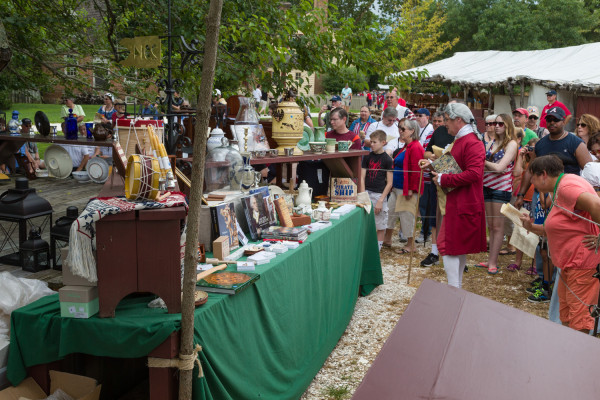 In conjunction with the projected late-September opening of the new Market House, a truly special item will be up for bid: a solid sterling silver Market House bell made at the Geddy Foundry. It measures about a foot tall. The lucky winner will get to have it engraved to his or her liking.
In conjunction with the projected late-September opening of the new Market House, a truly special item will be up for bid: a solid sterling silver Market House bell made at the Geddy Foundry. It measures about a foot tall. The lucky winner will get to have it engraved to his or her liking.
So about that other bell, the one used to herald the Saturday auction along Duke of Gloucester Street. Each bell is used only once and then auctioned off the same day. It’s not available in any of the stores, so it has become perhaps the most hotly contested souvenir. “We can never sell a bell that didn’t come from a real auction,” says Paulson.
It comes engraved with the date, making it a particular favorite for guests celebrating anniversaries or other special days.
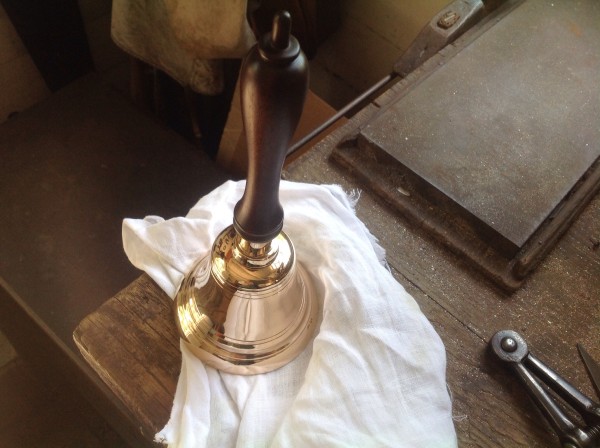 So bring your ready money and find a treasure. Auctions take place every Saturday at 1:30 pm as well as on other select occasions, such as Labor Day and the Market House opening. There is also an abbreviated auction across from the Apothecary on Wednesdays and Fridays as part of the Revolutionary City programming.
So bring your ready money and find a treasure. Auctions take place every Saturday at 1:30 pm as well as on other select occasions, such as Labor Day and the Market House opening. There is also an abbreviated auction across from the Apothecary on Wednesdays and Fridays as part of the Revolutionary City programming.
Like many Colonial Williamsburg experiences, the auction is an opportunity to immerse yourself by participating. But unlike the Revolution, here you can actually influence the outcome.
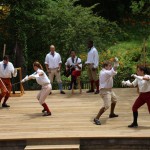
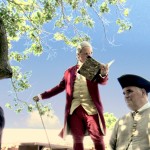
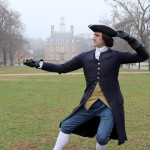
We just won an auction today October 28, 2017. It was the set of black iron lamp set. when we opened the box the big lamp’s glasses were broken. how can we get replacements for?
Hi,
Can you bid online I live in California and can’t be at the bidding for one of the bells.
Thanks, James Rider
Not sure if this will reach Bill Sullivan, but if you are planning any publicity for the July 4, 2017 Auction - or any others - I am a volunteer at the sales and also post info on them on several Facebook sites such as Colonial Williamsburg Friends each week, along with photos of so,e of the merchandise. I have photos of sales, crowds, staff and merchandise I would be happy to share with you. In fact, the photo at the top of this blog was one I had shared in the past,
Is it possible to see what’s being auctioned and bid remotely?
I’m sorry, there isn’t. The auctions are a special opportunity for on-site guests. The entertainment is as important as the auction!
Actually, you can bid if you are not in town by contacting Denise Chiera at dchiera@cwf.org by 5pm the day before the sale. She will contact you back to finalize info and will bid for you at the Auction and contact you with the results afterward. I post the list of items on Thursday or at the latest Friday on Colonial Willia,sburg Friends and Colonial Williamsburg Fans, which are both Facebook pages. I do this as a voluntary thing, not connected to CW in any official capacity
Always glad to see information on the auctions! They are truly a hidden gem. Wonderful opportunities for unique items, lots of entertainment and the proceeds return to the Foundation for programs. Everybody wins!